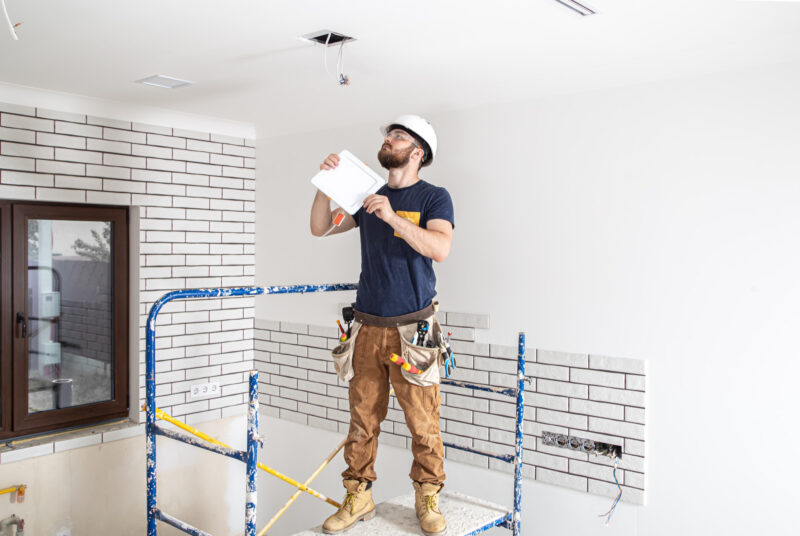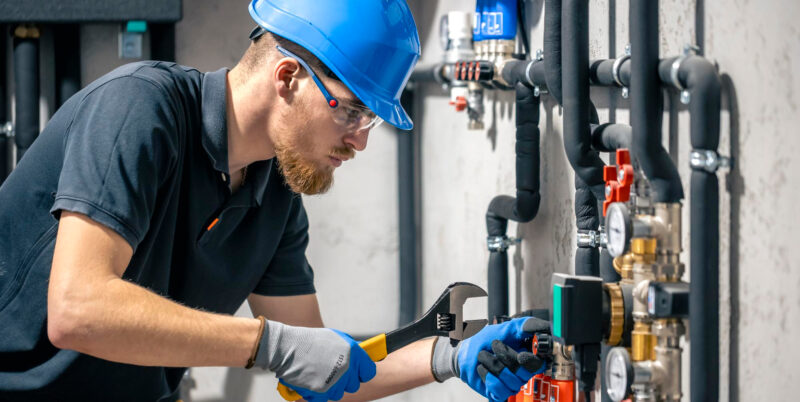With their prominence on the rise across the country, buying a strata unit may be the next step in your property journey – and the fact that strata titles now make up more than 20% of living arrangements in New South Wales is further testament to this.
But there’s more to owning a body corporate than just a new income stream. Strata buildings require round-the-clock maintenance and vigilant management to run efficiently and maintain compliance with local building codes and regulations, as well as minimum rental standards.

Note: It can take a village to keep a strata building up and running, and a good strata building manager knows they cannot do it alone. Building managers employ a wide variety of tradespeople and specialists to keep things running smoothly and in compliance with local laws.
So what trades contacts should you expect a quality strata manager to have in their address books? Here are just the top essential tradespeople that your strata manager should have handy in the event that your strata building suddenly becomes in need of urgent repairs or essential maintenance to ensure ongoing compliance.

Electricians
Strata managers likely have their electrician’s phone number on speed dial, and for good reason. Strata buildings often face unique electrical issues given their scale and age. A good building manager will have connections with reliable electricians for strata properties who know what they are doing and, most importantly, are local.
Trusted electricians, like Approved Electrix in Melbourne, for instance, have been serving their neighbourhoods for over 20 years. In the Melbourne city centre, where change is a constant, calling upon an electrical service provider who knows the area like the back of their hand is preferable since they’ll be better equipped to handle any older electrical systems and infrastructure.
In Australia’s larger city centres (like Melbourne and Sydney), where construction often marries the old and the new, experience working with and modernising outdated electrical systems becomes essential. This keen understanding of the area’s history will make electrical repairs, routine inspections, and upgrades more dependable – no matter how old or how large your strata complex may be.
Being down the street helps, too, so any emergencies can be addressed as quickly as possible. The closer the working relationship between strata managers and their electricians, the better, since they can be tapped for services beyond repairs, like pre-sale electrical inspections and routine fire alarm servicing.

Plumbers
It cannot be overstated just how important a role plumbers play in helping manage a strata building. Like electricians, building managers are probably calling upon their services every week—every day, even. Compliant residential buildings require ongoing servicing by experienced professionals, from routine plumbing maintenance to emergency repairs.
Plumbing services run the gamut, from a leaking shower head or slowly draining kitchen sink to an exploded toilet cistern or burst pipe. Unresolved plumbing issues can also spell disaster down the line for strata managers, quickly ballooning into unsafe and costly problems with ripple effects throughout the building, even impacting the electrical and fire alarm systems.

Note: Good plumbing requires proactive maintenance and speedy response times.
Unaddressed plumbing issues worsen and are a fast way to drain a strata building of its value, so your manager might even have multiple local plumbers under their employ to address the variety of problems that can come up. Otherwise, your body corporate may be at risk of flushing money down the toilet.

Locksmiths
Locksmiths are another essential group of tradies your strata manager will likely employ often. According to rental laws across most, if not all, Australian states and territories, keys must be provided for every door in a rental unit. For strata complexes, this responsibility will fall upon your building manager, who will need to oversee every door and every lock—old, new, and in-between. Body corporates will need to cut new keys for new residents, make copies for tradies, replace any broken or lost keys, and service existing locks in the building regularly.
We’ve all been there personally, either locking ourselves out of our apartment or losing a key (or two). When strata title owners and tenants in strata properties are in the same situation, they can be referred to the building’s local locksmith at the manager’s behest, who can ideally provide speedy service.

Tip: Working with a reliable, local locksmith is ideal since they will have an intimate understanding of the building and can offer 24/7 help when stuck.
Strata managers who are able to take after hours requests and offer access to these emergency locksmith services are naturally going to be able to offer a greater level of support to title owners.

Landscapers & Gardeners
The property’s exterior is just as important as its interiors. Gardening and landscaping can impact a strata building’s performance on the market, so another crucial tool in your manager’s belt is an excellent gardening team. Well-kept gardens, neat hedges, healthy lawns, and creatively designed flower beds can help create a strong first impression for residents, visitors, and potential buyers.

Note: A skilled gardener or landscaper will work strategically to enhance the property’s appearance, improve outdoor functionality, and ensure plants are thriving year-round with regular upkeep.
Your manager will employ a local gardener who can appreciate the area’s unique climate and season to plan accordingly to spruce up shared spaces like shared courtyards, barbecue patios, or walking paths.
For strata managers, having a reliable landscaping professional on call is a powerful asset. They help maintain a consistent appearance for the building, supported with ad hoc work that contributes to residential satisfaction. In the strata building world, a well-kept exterior isn’t just decoration, but a long-term investment.

Window Cleaners
Here’s one tradie you may have forgotten about, but your strata manager surely hasn’t: the window cleaners! For many people, the façade of a strata building offers their first impression, and nothing ruins a good first impression more than dirty or broken windows.
Like thoughtful landscaping and gardening services, managers understand that keeping windows clean and presentable comes with good building management. Professional window washers will reach out to managers in advance of their servicing so that residents can mark cleaning days on their calendars.
Caring for the windows with regular cleaning keeps things polished, presentable, and compliant, and helps allow more natural light in for residents. During a routine cleaning, damages or faults may also be brought to light. Your manager may even employ window washers whose company can also offer repairs, which reflects well on the building
Strata Managers Protect Investments with Reliable Tradies
Strata buildings are living, breathing communities, and keeping them safe, functional, and appealing to buyers requires good management. A good strata building manager will employ a trusted network of skilled tradespeople to get the jobs done and help owners save money on their levies.
From electricians and plumbers, who keep the lights on and prevent costly disasters, to landscapers and window cleaners who maintain the property’s appearance, every tradie plays a vital role in a manager’s efforts to support the building.
But the list goes on! This is by no means an exhaustive list of every tradie working in a strata building. There are also painters, carpenters, roofers and tilers, all of which play a vital role in maintaining and performing repairs as they’re needed.

Note: By working with reliable, local professionals, strata managers can respond quickly to emergencies, stay on top of maintenance, and ensure compliance, thus safeguarding your investment and making it a place anyone would be proud to call home.